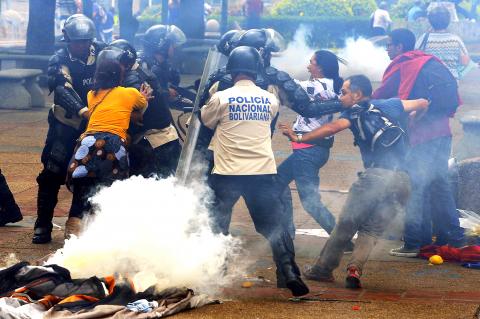Young people clashed with police in the streets on Thursday in an angry response to Venezuelan security forces dismantling four tent cities maintained by anti-government demonstrators, and officials reported one officer killed and another injured.
The bloodshed came after hundreds of police and troops arrested 243 student protesters during pre-dawn raids on camps in front of the offices of the UN and in better-off neighborhoods in the capital largely opposed to Venezuelan President Nicolas Maduro’s socialist government.
Venezuelan Interior Minister Miguel Rodriguez Torres presented homemade mortars, guns and Molotov cocktails that he said were seized at the camps and used to carry out “terrorist” acts against security forces.

Photo: AFP
“This shows there was an entire logistical apparatus in place,” Rodriguez Torres said, seeking to counter claims that the anti-government movement has been peaceful and spontaneous.
Dozens of anti-government activists erected barricades throughout the day to express solidarity for the jailed students, setting off clashes with police. One officer was killed and another wounded by gunfire.
Maduro said the officer was killed by a sniper while police cleared the streets of debris in the leafy Chacao district where the UN office is.
“He was protecting the community of Chacao and was killed vilely by these right-wing assassins,” Maduro said at an event in Caracas to deliver homes to low-income families.
The death brought to 42 the number of people on all sides who’ve been killed since anti-government protests began to roil the nation in February.
The dismantling of the camps was announced just hours before a top opposition leader, Leopoldo Lopez, was scheduled to appear in court after being in custody since February.
The hearing on whether he should begin trial on charges of inciting violence at anti-government protests was suspended and he was taken back to a military prison almost as soon as he arrived at the courthouse downtown.
Witnesses near the UN office said hundreds of National Guardsmen began arriving after 3am and were greeted angrily by neighbors who launched objects and insults from nearby balconies.
Rodriguez Torres said the operation was carried out cleanly, with security forces relying on the element of surprise rather than aggressive force to round up the protesters.
He said the detainees would be charged, but did not say when.
Under Venezuelan law, prosecutors have 48 hours to bring detainees before a judge and either charge or release them, but in recent months officials have often ignored the rules and held protesters incommunicado for longer periods.
Hours after the raids, a scattered detritus of shoes, clothes and destroyed banners littered the streets where the makeshift campground once stood. A few dozen neighbors built barricades to block traffic, demanding the release of the students.
“How can this be allowed when the constitution guarantees the right to peaceful protest,” said Anais Serrano, a real estate agent. “These kids weren’t anything bad.”

Kehinde Sanni spends his days smoothing out dents and repainting scratched bumpers in a modest autobody shop in Lagos. He has never left Nigeria, yet he speaks glowingly of Burkina Faso military leader Ibrahim Traore. “Nigeria needs someone like Ibrahim Traore of Burkina Faso. He is doing well for his country,” Sanni said. His admiration is shaped by a steady stream of viral videos, memes and social media posts — many misleading or outright false — portraying Traore as a fearless reformer who defied Western powers and reclaimed his country’s dignity. The Burkinabe strongman swept into power following a coup in September 2022

‘FRAGMENTING’: British politics have for a long time been dominated by the Labor Party and the Tories, but polls suggest that Reform now poses a significant challenge Hard-right upstarts Reform UK snatched a parliamentary seat from British Prime Minister Keir Starmer’s Labor Party yesterday in local elections that dealt a blow to the UK’s two establishment parties. Reform, led by anti-immigrant firebrand Nigel Farage, won the by-election in Runcorn and Helsby in northwest England by just six votes, as it picked up gains in other localities, including one mayoralty. The group’s strong showing continues momentum it built up at last year’s general election and appears to confirm a trend that the UK is entering an era of multi-party politics. “For the movement, for the party it’s a very, very big

ENTERTAINMENT: Rio officials have a history of organizing massive concerts on Copacabana Beach, with Madonna’s show drawing about 1.6 million fans last year Lady Gaga on Saturday night gave a free concert in front of 2 million fans who poured onto Copacabana Beach in Rio de Janeiro for the biggest show of her career. “Tonight, we’re making history... Thank you for making history with me,” Lady Gaga told a screaming crowd. The Mother Monster, as she is known, started the show at about 10:10pm local time with her 2011 song Bloody Mary. Cries of joy rose from the tightly packed fans who sang and danced shoulder-to-shoulder on the vast stretch of sand. Concert organizers said 2.1 million people attended the show. Lady Gaga

SUPPORT: The Australian prime minister promised to back Kyiv against Russia’s invasion, saying: ‘That’s my government’s position. It was yesterday. It still is’ Left-leaning Australian Prime Minister Anthony Albanese yesterday basked in his landslide election win, promising a “disciplined, orderly” government to confront cost-of-living pain and tariff turmoil. People clapped as the 62-year-old and his fiancee, Jodie Haydon, who visited his old inner Sydney haunt, Cafe Italia, surrounded by a crowd of jostling photographers and journalists. Albanese’s Labor Party is on course to win at least 83 seats in the 150-member parliament, partial results showed. Opposition leader Peter Dutton’s conservative Liberal-National coalition had just 38 seats, and other parties 12. Another 17 seats were still in doubt. “We will be a disciplined, orderly